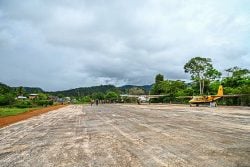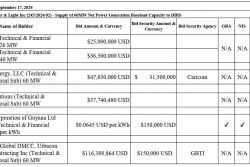Dear Editor,
My view of our world is aligned with that of our Indigenous brothers and sisters, “The earth does not belong to us; we belong to the earth” (Low, 1995). As such, we should respect the earth’s life-giving nature. I lived in Canada for some time and recently returned to my home country. Being a proud Guyanese, I have personal experience with the growing issue of environmental pollution in our beautiful homeland. Roadside ditches, public spaces, and food containers are filthy with garbage, containing wrappers, plastic bottles, and other items. In addition to being unpleasant, this problem threatens our shared future.
I recently encountered a man, my childhood friend, who casually threw his empty food box into a trench. From the look I gave him, he said, “Everybody does do it, and that trench got to be cleaned” he unhappily excused himself for not using a nearby trash can. Well, from what I remember to be clean flowing waters, the trench is now indeed a dumpsite for those living in Samaroo Dam, Pouderoyen.
As I traveled across the Demerara Harbour Bridge, I witnessed more public dumping into our river. I also saw that burning trash is a common issue because waste removal services are said to be too costly for residents. Environmental pollution and health hazards result from this. Even while schools teach appropriate disposal, children still pick up after their parents because they see them littering. While this might be a prevalent mindset of careless dumping, there is a need for a shift in our thinking to maintain the cleanliness of the environment.
How Can We Improve? Government agencies must take the lead with local groups and residents to address the current situation. Together, we can solve this problem as “One People” and show our love for Guyana.
1. Improve Waste Management: In low-income and rural communities, the government should provide affordable waste collection. Garbage that is not collected well ends up being dumped and burned. One way to fix this is by putting more public trash cans beside roads and in parks. 2. Implement more rigid rules and penalties: To discourage careless garbage disposal, impose fines for littering nationwide. Discounts and public recognition are examples of positive incentives that can encourage good behavior. 3. Fostering community involvement in clean-up initiatives: Regular clean-up events should unite people as one Guyana, fostering responsibility and a sense of community. Furthermore, religious and social institutions have the power to raise environmental consciousness and encourage those who follow them to act responsibly.
4. Promoting recycling and composting: Establishing broad recycling facilities to facilitate national transformation. People in Guyana would be able to exchange glass, metal, and plastic for cash or gift cards at these sites. Reducing waste sent to landfills is another goal of encouraging home composting for organic waste. 5. Improving knowledge and awareness: More environmental education should be taught in classrooms and rural community centers. Put into practice useful programs like recycling drives and educational field trips to teach children the importance of protecting the environment. Start public awareness efforts through TV, radio, and social media platforms to emphasize the negative consequences of littering and encourage a more sustainable, clean Guyana.
A nationwide effort as One Guyana: Environmental protection is a shared national responsibility. Every person contributes significantly by teaching the next generation and properly disposing of their waste. Because Guyana’s natural beauty impacts our health, the environment, the economy, and tourism, it must be preserved. It’s time to give up giving reasons as to why, it’s to leave a cleaner, more beautiful Guyana for future generations, let’s come together as one Guyana and preserve and respect the environment.
Sincerely,
Narendra Persaud





